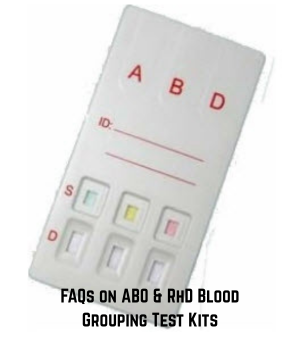Table of Contents
Blood grouping and typing are essential in healthcare, especially for transfusions, pregnancy monitoring, and ensuring safe medical treatments. The ABO and RhD blood grouping tests play a crucial role in identifying a person’s blood type, which is critical for patient safety in various medical procedures. This article explores frequently asked questions about the ABO test kit, RhD test kit, and their applications in blood typing, including their significance, accuracy, and how they are used across different medical settings. We will address common queries about these tests and their use in ensuring correct blood compatibility.
What is an ABO Blood Grouping Test Kit?
The ABO blood grouping kit is a diagnostic tool used to determine an individual’s blood group based on the ABO blood system. This system classifies blood into four groups: A, B, AB, and O, depending on the presence of specific antigens (A and B) on the surface of red blood cells.
- How does it work? The ABO blood test kit typically uses antibodies to react with the antigens present in the blood sample. The test results show the blood group by identifying the antigen-antibody reactions, which determine whether the blood type is A, B, AB, or O.
What is the Purpose of a RhD Test Kit?
A RhD test kit is used to determine whether a person’s blood type is Rh-positive or Rh-negative. The Rh factor is another antigen present on the surface of red blood cells, and it is critical for matching blood for transfusions.
- How does the RhD test kit work? The RhD test kit uses antibodies to detect the presence of the RhD antigen on the red blood cells. If the antigen is present, the result is Rh-positive; if it is absent, the result is Rh-negative.
- Why is it important? Knowing the Rh factor is vital during pregnancy (for example, in cases of Rh incompatibility) and for safe blood transfusions.
What is the Difference Between an ABO Test Kit and an ABO RhD Test Kit?

- ABO Test Kit: This test kit determines the ABO blood group, identifying the presence of A and B antigens on red blood cells.
- ABO RhD Test Kit: This is a more comprehensive test that not only identifies the ABO blood group but also detects the RhD factor. This dual test is used in situations where both the blood group and Rh status are required for safe transfusion or medical care, such as in pregnancy or blood donation.
How Accurate is the ABO RhD Blood Test?
The accuracy of the ABO RhD blood test depends on the quality of the reagents and the procedure followed. ABO blood tests are generally very accurate when performed correctly, as long as the blood sample is handled properly and there are no issues with contamination.
- How precise are these tests? When performed using high-quality kits and proper protocols, ABO and RhD test kits provide highly accurate results, typically within a few minutes. However, it is recommended to use confirmatory tests (like gel-based testing) if any doubt arises regarding the results.
How Long Does It Take for Results from an ABO RhD Test Kit?
- Instant Results: Some ABO RhD test kits offer instant results, typically in 5 to 10 minutes, especially when using rapid or point-of-care testing solutions.
- Lab-Based Results: If the test is being done in a laboratory setting, the results may take 24 to 48 hours to be processed, depending on the complexity and number of tests being done.
How are ABO and RhD Blood Grouping Tests Used in Different Industries?
ABO and RhD blood typing kits are used across multiple industries, with varying applications:
- Healthcare and Hospitals: To determine the blood type of patients before transfusions, organ transplants, and during pregnancy.
- Blood Banks: To ensure that the right blood type is available and safe for transfusion.
- Pregnancy and Prenatal Testing: In the case of Rh incompatibility, where a mother who is Rh-negative is carrying an Rh-positive baby, the test is crucial for managing potential risks.
What Sample Types are Used for ABO and RhD Blood Grouping Tests?
The most common sample types for ABO and RhD blood tests are:
- Blood (Venous or Capillary): A blood sample is typically drawn using a needle or from a fingerstick.
- Other Samples: In some cases, particularly for rapid testing, a blood spot or serum may be used for testing purposes.
Can Prescription Medications Affect the Results of an ABO RhD Test?
Typically, prescription medications do not interfere with the results of an ABO or RhD blood test. However, certain conditions or diseases may affect the test, and it’s important to consult with a healthcare provider if there are concerns.
- What medications could affect the results? Medications that impact the immune system or blood cells may potentially interfere with blood grouping results. Always inform your healthcare provider about any medications you are taking before undergoing the test.
How Often are ABO RhD Blood Group Tests Used in Pregnancy?
ABO and RhD blood tests are routinely used during prenatal care. If a pregnant woman is Rh-negative, it is crucial to monitor for Rh incompatibility, which could lead to hemolytic disease of the newborn.
- How does the Rh factor affect pregnancy? If the mother is Rh-negative and the baby is Rh-positive, the mother’s immune system may produce antibodies that attack the baby’s red blood cells. In such cases, proper medical management is essential.
Is the ABO RhD Blood Test Legally Recognized Globally?
Yes, ABO and RhD blood grouping tests are globally recognized and legally accepted. These tests are essential in medical diagnostics and are part of routine procedures in most healthcare systems worldwide. The legal recognition of these tests ensures that blood transfusions and organ donations are carried out safely.
- Which countries use ABO RhD blood tests? These tests are universally accepted, and countries like the United States, Canada, the UK, India, Australia, and most European nations routinely use ABO and RhD blood tests in hospitals and clinics.
How Should One Prepare for an ABO RhD Blood Test?
Generally, there is no special preparation required for an ABO RhD blood test. However, it’s always a good idea to inform your healthcare provider if you are on medications or have specific health conditions that might affect the test.
- Can you eat or drink before the test? Since the test is based on blood samples, there are typically no restrictions regarding food or drink, unless otherwise advised by your healthcare provider.
Can At-Home ABO Blood Test Kits Provide Accurate Results?
At-home ABO blood test kits are available, and while they offer convenience, their accuracy may not be as high as those performed in a clinical setting. These tests are often used for general knowledge rather than critical decision-making.
- How reliable are these at-home kits? They may provide reasonable accuracy but could be affected by user error. For medical decisions, always seek professional laboratory testing.
What Should You Do If Your ABO RhD Test Results Are Abnormal?
If the results of an ABO or RhD test are abnormal (e.g., showing an unexpected blood type or Rh incompatibility), consult with a healthcare provider immediately. They may recommend further tests to confirm results or assess any underlying conditions that may affect your blood typing.
Conclusion
ABO and RhD blood grouping tests are essential tools in the healthcare industry for ensuring safe transfusions, effective prenatal care, and overall patient safety. Whether for routine use in hospitals or specific applications like prenatal care, these tests offer vital insights into a person’s blood type. Understanding the processes, benefits, and applications of ABO and RhD blood test kits can help healthcare providers make informed decisions, ensuring the safety and well-being of patients globally.








